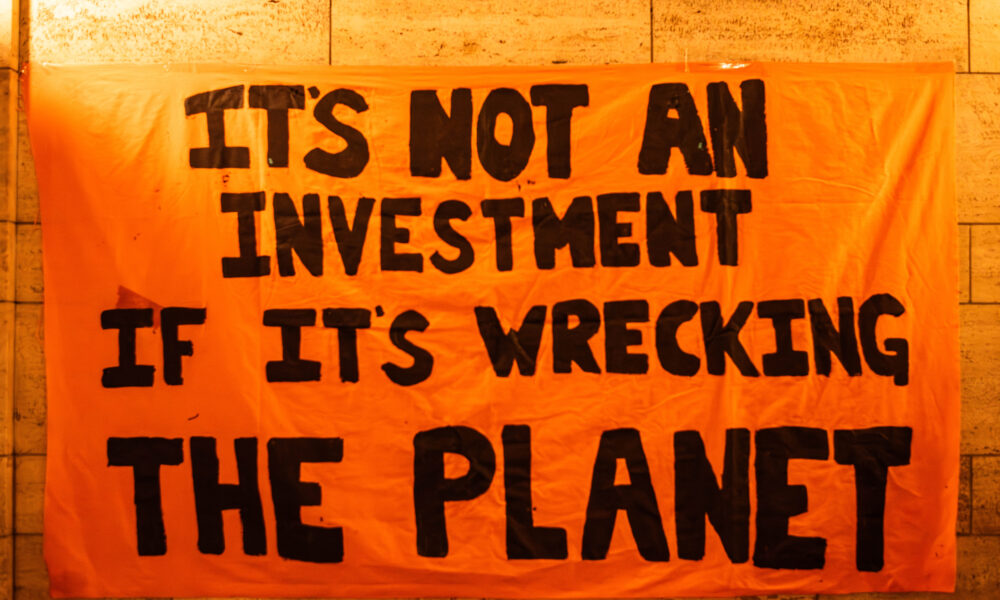On Feb. 8, students, faculty, and alumni joined Divest McGill in the Arts Building to celebrate the McGill Board of Governors’ (BoG) decision to divest from all direct holdings in Carbon Underground 200 (CU 200) fossil fuel companies by 2025. Divest McGill deliberately held the celebration in the Arts Building, where the organization had held an 11-day occupation just two years earlier, to call attention to the years of student activism that led to the BoG’s decision.
Lola Milder, U3 Arts, and member of Divest McGill, addressed the attendees in a speech. She highlighted that the decision came after a presentation the organization made to the BoG last fall, where Board members agreed to vote on divestment in December 2023. Following the vote, the BoG decided to adopt eight socially responsible investing (SRI) measures, including divestment from direct holdings in the CU200.
At the celebration, attendees enjoyed food provided by Midnight Kitchen while sharing stories about their involvement in Divest McGill over the years. David Summerhays, a former Divest McGill member, spoke about his experience campaigning for divestment when he founded the organization in 2012 in an interview with The Tribune.
“I don’t know if I can communicate to you how small we felt when we started. Nobody knew who we were,” Summerhays said. “[When] we knocked on a door, we never knew what they were going to say. [But] the answer kept being, ‘we support you.’”
Harlan Hutt, U2 Arts and President of the Association of McGill University Support Employees (AMUSE), spoke about his experience protesting with Divest McGill against the Royal Bank of Canada (RBC) in 2021 and how it impacted him as a union leader.
“The protest at RBC […] served as my introduction to student activism at McGill. I was able to connect with so many activists through this one protest, including people I still talk to, and who help inform my decisions as a union leader,” Hutt said.
Frédérique Mazerolle, a McGill media relations officer, provided The Tribune with a statement by email, stressing that the administration is open to discourse with student groups.
“Through the years, the University has had discussions with members of student clubs such as ESG McGill and the student-run club Divest McGill to discuss our strategy,” Mazerolle wrote.
Nonetheless, she maintained that the decision to divest was driven by the BoG.
“The decision by McGill’s Board of Directors to divest from carbon-intensive investment […] is a culmination of a carefully considered strategy implemented over the past few years, driven by McGill’s commitment to sustainability and aligning our investments with our values and community concerns,” Mazerolle wrote.
After more than a decade of organizing, many Divest McGill speakers questioned why McGill did not promise to divest before Dec. 2023. Summerhays said that the BoG’s decision reflects years of “snowballing” student activism.
Milder thinks that although student activism played a role in the decision, the changing political climate was also influential.
“I believe that if it was profitable for them socially and economically, [McGill] would still be invested. And so I think student organizing is part of what has changed that socio-political context and made [investments in fossil fuels] less feasible,” Milder said.
Milder also outlined some of Divest McGill’s concerns with the BoG’s SRI initiatives, noting that McGill has yet to commit to divestment from indirect holdings in fossil fuels. Further, she expressed some ambivalence towards the BoG’s commitment to allocate 10 per cent of the McGill Investment Pool (MIP) to investments aligned with the United Nations Sustainable Development Goals, which include broad objectives such as “end[ing] poverty in all its forms everywhere.”
“It is strategically vague, and students and faculty and other community members need to stay on McGill’s back to find out what those sustainable development investment goals are,” Milder said.
Others, including Tamara Ghandour, U2 Science, stated that it is not enough to only divest from fossil fuels and called on McGill to divest from Israeli companies complicit in the war in Gaza.
“So many issues are intersectional. Palestine is also an environmental issue. Environmental issues are also about violence and militarization and racism,” Ghandour told The Tribune. “There’s still so much divestment to be had.”
Milder echoed Ghandour’s sentiment about standing in solidarity with other student activist groups.
“As we get to feel a little bit of relief at the beginning of victory, we can also give support to our allies [….] This is a moment for expansion for climate justice organizing at McGill.”







